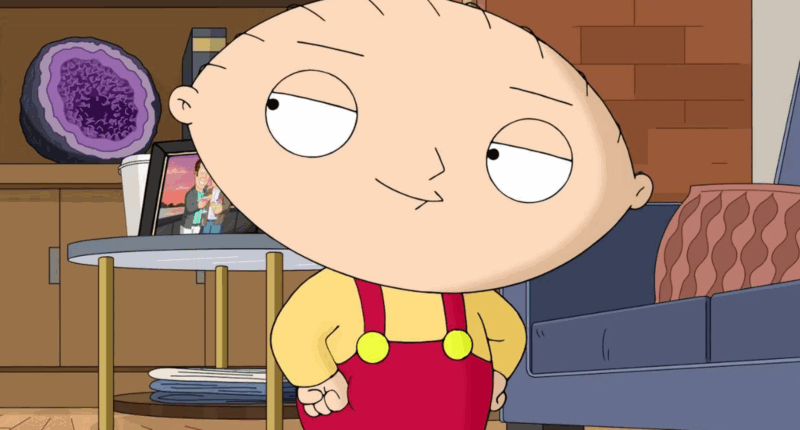Running for over 26 years and with 400 episodes, Family Guy is easily one of the most influential shows ever produced, with a deep lore and inside jokes that only true fans will understand. One of its strongest qualities is its meta aspects, where Family Guy regularly breaks the fourth wall, satirizes tropes and clichés found in other shows, and even pokes fun at some of the plot holes surrounding its own characters. Since its inception, Stewie (Seth MacFarlane) has been a fan favorite, not only for his audacious humor and bizarre subplots, but also because of the self-aware approach Family Guy takes to him, as it acknowledges how inconsistently other characters understand him, along with his unnatural British accent.
For that reason, when Season 16, Episode 12, “Send in Stewie, Please” chose to abandon much of the traditional Family Guy structure in favor of a character study focused on Stewie and another character, the result was bound to be fascinating. However, this episode went further than fascination and is actually Family Guy‘s best-written episode, with brilliantly paced dialogue alongside its character-driven narrative.
“Send in Stewie, Please” is ‘Family Guy’s Most Unique Episode
Everyone knows what the typical Family Guy episode looks like: two or three subplots, with outlandish premises, coupled with cutaways and gags throughout every scene. “Send in Stewie, Please” does away with all of these. The entire episode takes place in a child psychologist’s office between Stewie and a therapist named Cecil, voiced by Sir Ian McKellen. Immediately, there is something different about this episode, as Stewie goes on a long opening monologue about his day and habits before Cecil utters a word. Not only does this make the reveal of McKellen’s voice a shock, since all we had heard previously is a tiny line of, “Send in Stewie, please,” but it is also a sequence that makes it clear there will be no cutaways, nor any other characters. Instead, this episode exists purely to examine Stewie’s personality after an incident at daycare.
‘Family Guy’ Addresses Several Fan Theories Around Stewie in “Send in Stewie, Please”
The twelfth episode of Season 16 was given an extended runtime with few ad breaks, allowing for a microanalysis of some of Stewie’s most interesting character details. While Stewie acknowledges how it is inconsistent in how some characters understand him and others don’t, which doesn’t answer many questions, his sexuality is explored thoroughly. We see Stewie essentially embrace his queer identity, as he refuses to conform to one binary category, and framing this around his pushing of another boy down the stairs offers an intriguing look into how Stewie’s actions indirectly reflect a lot about his insecurity about his identity.

The 70 Best Animated Series For Adults, Ranked
Don’t let your kids watch these animated shows!
The episode also conveys a far darker side of Stewie, as he completely destroys Cecil’s perception of his relationship via one photograph, as well as leaving death in his wake by the end of the episode. By this point, his evil side had been toned down, and there was much less emphasis on his hatred for Lois (Alex Borstein). Yet, this episode reminds the audience that Stewie is a complex character, which is why he remains so beloved.
Stewie Reveals His True Accent in ‘Family Guy’s Best-Written Episode
As previously mentioned, it is Stewie’s British accent that is the most inexplicable aspect of the character, considering he is a baby born to American parents in Rhode Island. However, “Send in Stewie, Please” turns this plot hole on its head by embracing its lack of logic. Throughout the episode, Cecil rubs it in Stewie’s face that he cannot hear a British accent, since Cecil is British himself, much to Stewie’s chagrin. This, along with the rest of the self-examination, encourages Stewie to reveal his “real” accent to the audience, and it is an almost unholy moment to hear his high-pitched American accent spoken for so long. Yet, thankfully, this doesn’t last for long, and Family Guy uses the moment to reveal that Stewie puts on the accent as a barrier to others, trying to make himself appear special, which he embraces by the end.
This doesn’t just highlight Stewie’s layered insecurities masked by confidence, but makes something random a key part of Stewie’s character. For some, this may make the episode feel too contained, as, technically, there are not many changes for Stewie moving forward. Yet, it still serves as a must-watch episode for understanding the depth of Stewie’s character. His accent, his sexuality, and even his intelligence are not merely traits MacFarlane thought would be funny, but make him arguably the best character in all of Family Guy.










